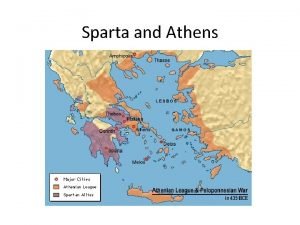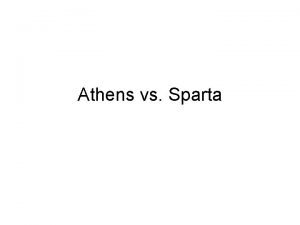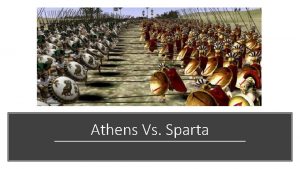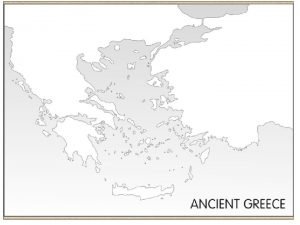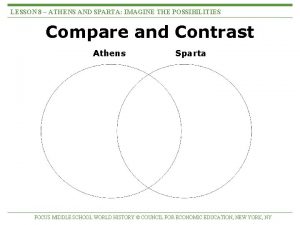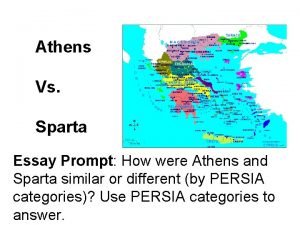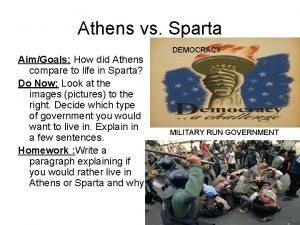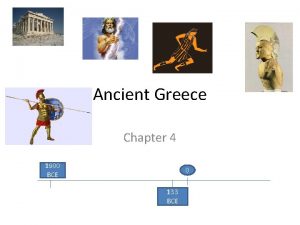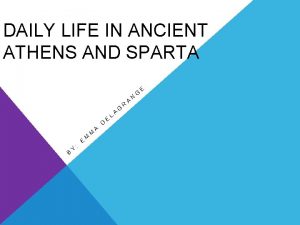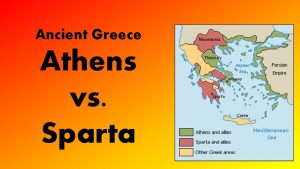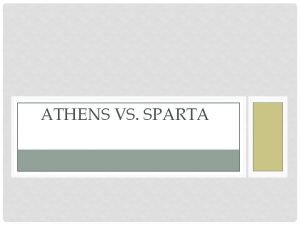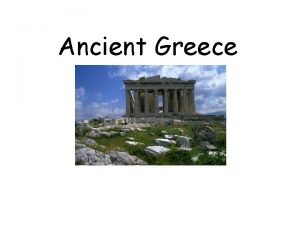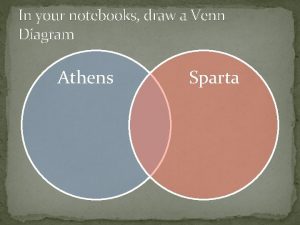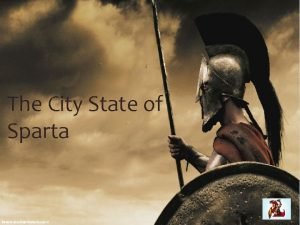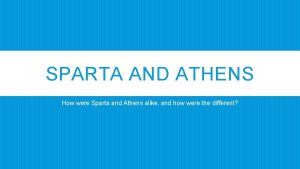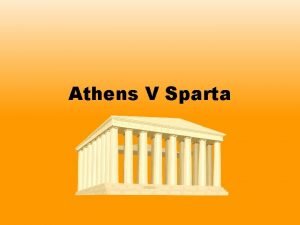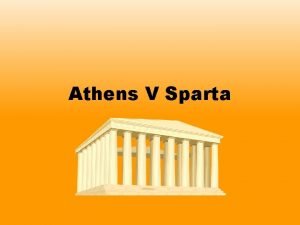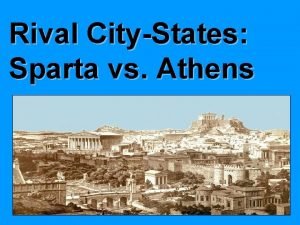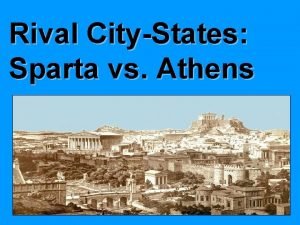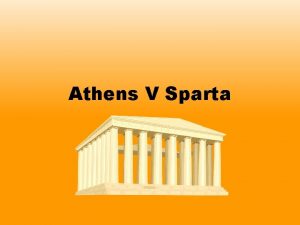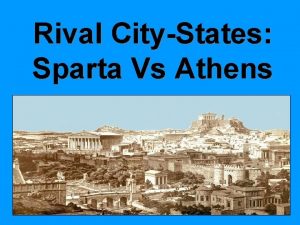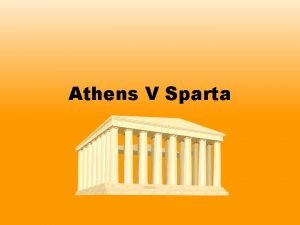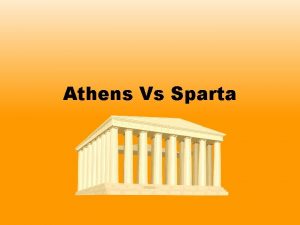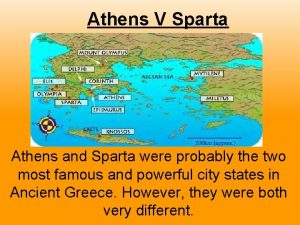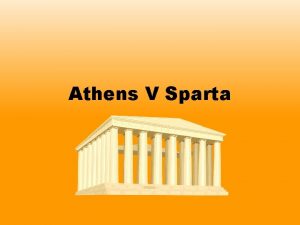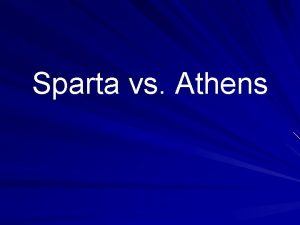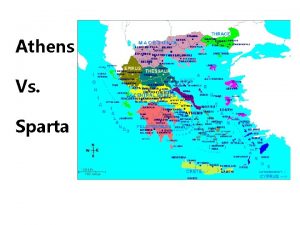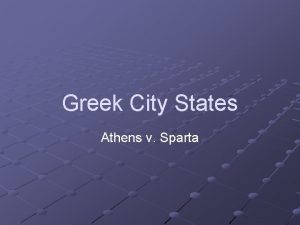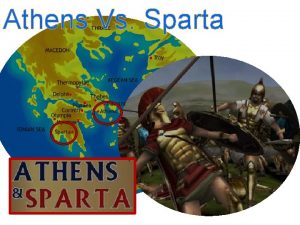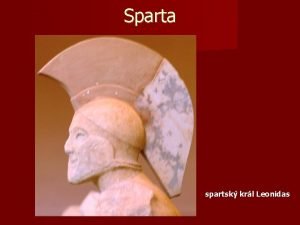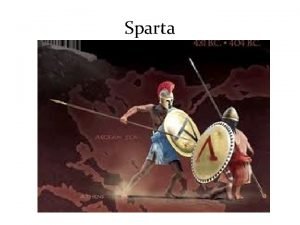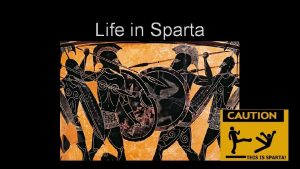Sparta and Athens Tyranny in the City States



























- Slides: 27

Sparta and Athens

Tyranny in the City- States • Rule by the nobles was short lived • First challenge to their rule was from farmers • Farmers borrowed money from the nobles to keep their farms going

Tyranny in the City- States • The farmers in debt lost their land had to work for the nobles • 650 BC farmers began demanding changes in power structure p. 5

Tyranny in the City- States • Merchants and artisans also wanted a say in government, but were considered noncitizens because they did not own property p 3

Tyranny in the City- States • The growth in unhappiness led to the rise in tyrants • Tyrants- someone who takes power by force and rules with total authority

Tyranny in the City- States • 600 BC tyrants overthrew the nobles • Tyrants made themselves popular by building new marketplaces, temples, and walls.

Tyranny in the City- States • Majority of people did not want rule by one person • Wanted rule by law with all citizens participating • 500 BC most tyrants fell out of power

Tyranny in the City- States • Most City- States became either oligarchies or democracies • Oligarchy- A few people hold power • Democracy- all citizens share in the running of government

Sparta • Importance of the Military • Conquered and enslaved neighbors • Helots- Captive workers • Sparta feared that the Helots would rebel • Age 7 boys left their families and trained for war and Were harshly treated

Sparta • Age 20 entered the regimental army • Men remained in the army for 10 years • Men returned home at age 30 but stayed in the army until age 60 • Surrender not an option

Sparta • Girls trained in sports • Running, wrestling, and javelin • Wives lived at home while the men lived in barracks • Women could own property and go where they wanted

Sparta • Spartan Government • Government was an oligarchy • 2 kings headed a council of elders • The council, 28 men over age 60 proposed laws to an assembly

Sparta • All Spartans over age 30 belonged to the assembly • Voted on laws and chose 5 people to be ephors • Ephors-enforced laws and collected taxes

Sparta • To keep anyone from questioning system foreign visitors were discouraged • Travel abroad not allowed • Frowned upon citizens who studied literature or the arts

Sparta • Spartans succeeded in controlling the Helots for 250 years • By focusing on military matters Spartans fell behind other Greeks in Trade • Knew less about Science and other subjects • 4 -2 A

Athens • Athens more interested in building a democracy rather than military force

Athens • Education was very different • Boys taught to read and write and do math • Another teacher taught sports • A third teacher taught them to sing and do instruments • Age 18 boys finished school and became citizens

Athens • Girls stayed at home • Mothers taught spinning and weaving • Only in wealthy families did girls learn to read • When they married they stayed at home to teach their daughters

Athens • Early Athens ruled by land owning nobles around 600 BC • Athens Had an assembly of citizens, but had few powers • Farmers owed the nobles money and many sold themselves into slavery to pay their debts

Athens • To solve problem farmers went to Solon • Solon- Noble trusted by farmers and nobles; canceled the farmers debt and freed those in slavery • Allowed all male citizens to participate in the assembly and law courts

Athens • Council of 400 wealthy citizens wrote the laws but the assembly had to pass them

Athens • Farmers pressured Solon to give away the nobles’ land but he refused. • After Solon’s rule, there would be 30 years of chaos.

Athens • Peisistratus a tyrant seized power in 560 BC • Won support by dividing up large estates among the poor farmers • Loaned money to poor people and gave them jobs building temples and other public works.

Athens • Cleisthenes came to power in 506 BC • Reorganized the assembly to play an important part in government

Athens • • Cleisthenes Allowed for open debate Hear court cases Appoint army generals Appointed an assembly of 500 people to carry out daily business

Athens • Council was chosen once a year in a lottery; thought this system was much more fair • Women, foreign born men, and slaves were not allowed in the process. • Cleisthenes credited for making Athens a democracy 4 -2 B

review • Who were the Helots? • Why did the tyrants fall out of favor with the Greeks? • Why did the Athenians Choose the lottery system for choosing public officials? • Why was Solon popular among some farmers? • How did Athenian democracy keep any one person from gaining too much power?
 Checks and balances dbq
Checks and balances dbq Sparta tyranny
Sparta tyranny Why is athens better than sparta
Why is athens better than sparta Athens and sparta differences
Athens and sparta differences Sparta vs athens activity
Sparta vs athens activity Adriatic sea ancient greece map
Adriatic sea ancient greece map Compare sparta and athens
Compare sparta and athens Explain physical education in sparta
Explain physical education in sparta Compare contrast athens and sparta
Compare contrast athens and sparta Athens v sparta comparison chart
Athens v sparta comparison chart Differences between athens and sparta
Differences between athens and sparta Compare contrast athens and sparta
Compare contrast athens and sparta Differences between sparta and athens venn diagram
Differences between sparta and athens venn diagram Daily life in ancient athens
Daily life in ancient athens Athens and sparta primary sources
Athens and sparta primary sources Geography of athens and sparta
Geography of athens and sparta Athens vs sparta differences
Athens vs sparta differences Spartans
Spartans Pamahalaan ng kabihasnang greece
Pamahalaan ng kabihasnang greece Is athens northeast of sparta
Is athens northeast of sparta Heograpiya ng athens at sparta
Heograpiya ng athens at sparta Paano narating ng athens ang ginintuang panahon?
Paano narating ng athens ang ginintuang panahon? Athens vs sparta venn diagram
Athens vs sparta venn diagram Fight for sparta or athens
Fight for sparta or athens Sparta vs athens debate
Sparta vs athens debate Spartan women rights
Spartan women rights How powerful was sparta
How powerful was sparta City state of sparta
City state of sparta

